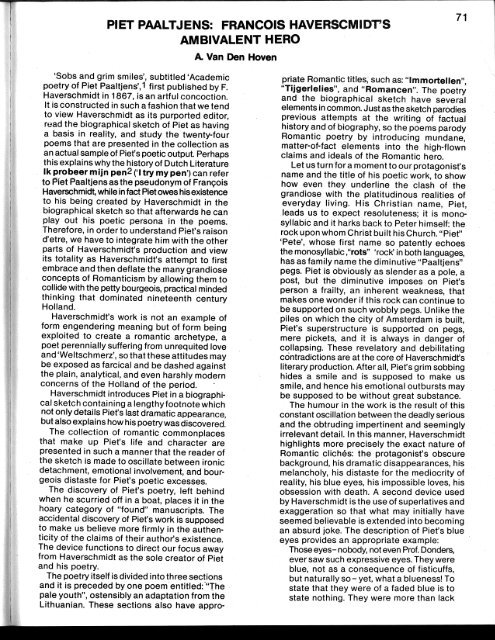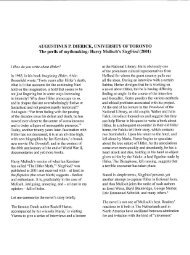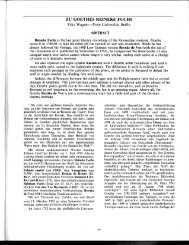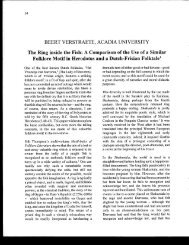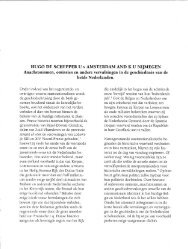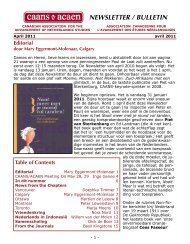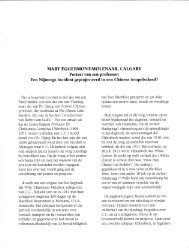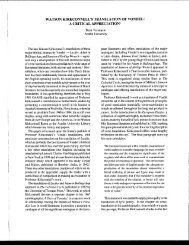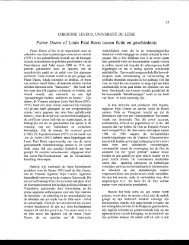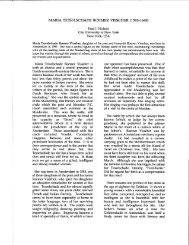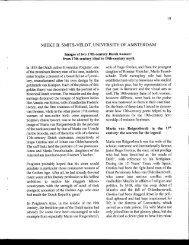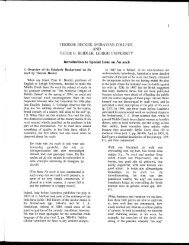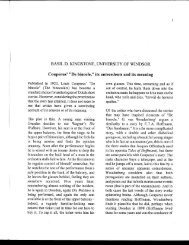ADRIAN VAN DEN HOVEN - Piet Paaltjens, François ...
ADRIAN VAN DEN HOVEN - Piet Paaltjens, François ...
ADRIAN VAN DEN HOVEN - Piet Paaltjens, François ...
You also want an ePaper? Increase the reach of your titles
YUMPU automatically turns print PDFs into web optimized ePapers that Google loves.
-lustre blue, infinitely more. Their blueness<br />
was apoplectic and it was still more. As<br />
long as the new dictionary is not yet out,<br />
we won't have a word for it. But - take a<br />
haddock, place it on a fairly warm stove,<br />
leave it there for three days, preferably in<br />
the sun, and if you can still remain in its<br />
presence, stare it firmly in the eyes, then<br />
you will have a vague notion of the genial<br />
blue of the boy's supernatural stare. Andnow<br />
imagine nature's subsequent stroke<br />
of genius - this blue-eyed youth was<br />
cross-eyed so that, while one eye stared<br />
into the measureless depths of the waters,<br />
the other one gazed towards the horizon.<br />
(Our translation, p.7-8).3<br />
The attempt to define as precisely as possible<br />
the exact hue of <strong>Piet</strong>'s eyes by means of an<br />
accumulation of naturalistic detail results in<br />
sensory overload which overwhelms one's<br />
potential concern with the blueness of his<br />
eyes.<br />
The introductory poem: "The pale youth" (he is<br />
suffering from unrequited love and he dies<br />
literally ot a broken heart) derives its humour<br />
from the author's juggling of grammatical categories.<br />
Poetic licence and tradition permit the<br />
substitution of '''t'' for "het" with such impersonal<br />
verbal syntagms as "het regent"; however, the<br />
poet also substitutes nouns for verbs thereby<br />
creating such (impossible) segments as: It<br />
mornings, it evenings ... ('t Morgent, 't Avondt).<br />
The poems of the first section, entitled<br />
"Immortellen", treat of the absence and/or of<br />
the fleeting nature of friendship and love. They<br />
possess two additional characteristics. They<br />
are exceedingly vague about the exact cause<br />
of the poet's suffering and they mix the effusion<br />
of sentiment with realistic detail. The vagueness,<br />
in turn, has two explanations: the poet<br />
does not wish to let the world know who or<br />
what is at the heart of his suffering and, anyway,<br />
he is not quite sure himself. In order to create<br />
these deliberate ambiguities the poet exploits<br />
the polysemous nature of language. When he<br />
states that his suffering is nobody's (no creature's)<br />
business, he is referring simultaneously<br />
to the moon and to us(see poem I, p. 20). When<br />
he asks: 'but do my tears spring from a source?'<br />
(poem III, p.21) he plays with the fact that the<br />
word "spring" allows one, perhaps unjustly, to<br />
view tears as a current. Which raises the<br />
question whether their flow can ever be stopped<br />
and, as well, whether his crying has a real<br />
cause. The realistic detail, which would seemingly<br />
aid in making the poems more believable, has<br />
the oppOSite effect because they distract from<br />
"the high purpose" and force us to focus on<br />
details, on facts as well as on the importance of<br />
72<br />
what happened. Therefore it becomes as<br />
important that he broke his promise as that he<br />
broke it 'half way between De Vink and the<br />
Haagsche Schouw' (poem IX, p. 22). The author<br />
plays with the hierarchy of values and<br />
by interpOSing insignificant details in his lyrics,<br />
he makes the obsession with friendship and<br />
love seem laughable. Since it matters that his<br />
friend buys his cigars at 'Blaauws's' (poem VI,<br />
p. 23) and that he plays 'The Turkish drum;<br />
(poem IX, p. 22), these details must be pertinent<br />
to the poem, just as it is important that it is'the<br />
milkman who otten says to the maid: "The<br />
/ .<br />
steps are wet c;lgam".' (poem XLIX, p. 26) But<br />
while we may go along with R. Barthes' dictum<br />
that: "Dans I'ordre du discours, ce qui est note<br />
est, par definition, notable",4 it will make us<br />
conclude that beyond the details and the<br />
Romantic pose little or nothing is significant in<br />
F. Haverschmidt's work.<br />
The poet seems to concur with this opinion,<br />
because in the last poem of section one he<br />
professes boredom with his emotional posturing.<br />
And we translate:<br />
Finally I became bored with hating, perpetually<br />
singing and lamenting. I fell silent,<br />
and no one on earth has ever been as<br />
silent as I am now.<br />
(Poem C, p. 32)<br />
The poet's ultimate posture is one of total<br />
non-communication, and the Romantic stance<br />
of the individual's unutterable uniqueness is<br />
dissolved by boredom into nothingness.<br />
The second section, "Tijgerlelies", differs<br />
from the first one in that each poem is dedicated<br />
to a young lady, and additionally in the poem<br />
dedicated to Rika a modern or even futurist<br />
element plays an essential role. It also harks<br />
back to Pascal's awareness of the "disproportion<br />
de l'homme".5 The grandiose love of<br />
the poet is born in the flash of an instant, even<br />
while he wishes that it may be demolished<br />
underneath the wheels of a thundering locomotive.<br />
It subsumes therefore Pascal's concerns<br />
with nothingness, man's insignificance<br />
within the vastness of the universe and, as<br />
well, Pascal's agonizing awareness of the<br />
frailty of man's consciousness. It also parodies<br />
the notions of eternal love and of love<br />
at first sight by having the poet fall in love with a<br />
girl of whom he catches a glimpse while their<br />
trains are paSSing each other at full speed.<br />
Again, the realistic elements are used by the<br />
poet to dissolve and destroy his lofty ideals. He<br />
stresses that they only met once, and that their<br />
encounter could not have been more brief. It is<br />
the truth of these statements that make one<br />
call into question the profundity of his love. But<br />
then the poet piles absurdity upon hollow<br />
agony by asking Rita 'why she did not pull the<br />
emergency brake so that they could have


